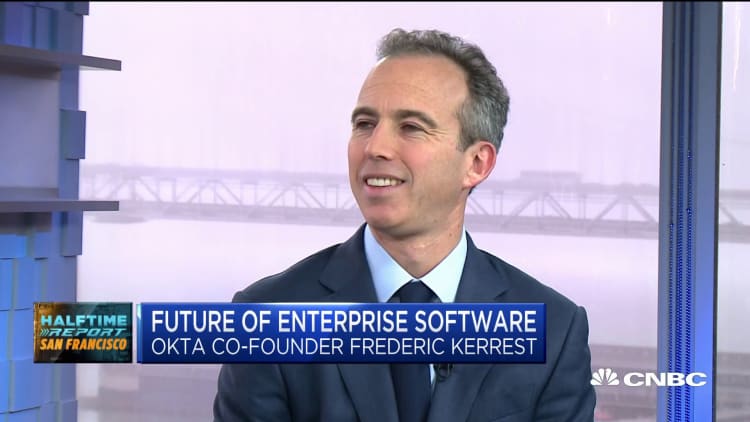As the 2010s come to a close, Okta co-founder Todd McKinnon leads a $14.6 billion company at the center of the rapidly expanding cloud economy. His personal stock is worth about $640 million.
It almost never happened.
In late 2008, as the economy suffered through its worst recession since the Great Depression, McKinnon became convinced that he should leave his senior executive role at Salesforce. So he put together a Google Slides presentation for his wife that he titled, "Proposal to move to a new job starting a company (Why I'm not crazy)."
McKinnon was in his mid-30s with a six-month-old daughter at home. His wife, Roxanne, whom he'd met in high school, wasn't sure if she wanted to go back to work and was concerned about McKinnon's job security given the state of the economy. McKinnon had also just been diagnosed with Type 1 diabetes, meaning good health-care coverage was vital.
In the 13-page presentation, which he recently shared with CNBC, McKinnon told his wife that he was bored at Salesforce, wasn't learning things at a rapid clip, was unlikely to gain more responsibility in the near future and wanted to start a company because the software industry is "going through the biggest shift I'll see in my career."
"Microsoft and Oracle were both started in poor economic times," wrote McKinnon.
McKinnon's proposal for a network monitoring company called Saasure included four possible scenarios for outcomes, ranging from worst — he fails to raise money and returns to work, possibly at Salesforce — to best, where he would operate the company for five to 10 years and take it public at a valuation of $50 million to $100 million. The middle scenarios involved running the company for a couple years and making enough to live during that time, or selling for $10 million to $20 million within five years.
It wasn't the most polished presentation. McKinnon said he'd already gotten commitments from two angel investors, Mike Dodd of Austin Ventures and David Schellhase, who was then general counsel at Salesforce. But he spelled both their names wrong, writing Dobb instead of Dodd, and dropping one of the ls from Schellhase, who's now general counsel at Slack.
(He blacked out some sensitive financial information from the original document.)
Taking the plunge
McKinnon resigned from Salesforce around Thanksgiving 2008, and then joined up with co-founder Frederic Kerrest, who'd also previously worked at Salesforce, in early 2009. The pair quickly moved away from application monitoring and shifted to identity management, with the idea that if workers were going to be using all these applications in the cloud, IT managers needed a way to keep everything secure and sanctioned.
"People seemed like they needed it sooner," McKinnon said, in an interview. A year later, they changed the name to Okta, a meteorological term that refers to the amount of cloud cover at a given time.
The company outpaced even his best expectations, going public in 2017 at an initial valuation of $1.5 billion. Okta is now one of the cloud success stories of the decade, poised to close the year at about $575 million in annual revenue, up 44% from a year earlier, though rising sales and marketing costs mean the company is still losing money. The stock is up more than seven-fold from its 2017 IPO, including jumping 89% this year.
While McKinnon saw the trend towards cloud apps well before it was obvious, any number of things could (and did) go wrong. Microsoft, which was developing what would become some of the most popular cloud apps as part of Office 365, steadily got more into cloud-based identity management. There were also products available from legacy providers like IBM and Oracle and emerging companies such as OneLogin and Duo Security (acquired by Cisco for $2.35 billion in 2018).
Then, there was the "super tough year" of 2011, McKinnon said. At that point, the company was already backed by venture firms Andreessen Horowitz and Floodgate, so expectations were on the rise. But Okta didn't have a lot of big clients and needed traction to get more money. McKinnon said he just wanted to close the year with 50 customers.
Hiring the right talent was a particular challenge because venture money was flowing into hot consumer companies like Foursquare, McKinnon recalled.
"We weren't the new kid on the block anymore, but hadn't been around long enough to get enterprise motion," said McKinnon. "We hunkered down and really wanted to get through the year."
McKinnon credits Khosla Ventures for coming in during trying times to lead the company's $16.5 million Series B funding in August.
Timing was everything
In the presentation to his wife, McKinnon may have been conservative about how big his company could be, but he was at least directionally accurate in predicting that the next great tech company — he named Oracle, Salesforce, Microsoft, Google and eBay as comparisons — would be created between 2006 and 2010.
There was logic to that timeframe.
In 2006, Amazon started offering storage and computing services so businesses could outsource their expensive data center needs and get off the ground with minimal costs. By 2008, it was clear that a new generation of cloud-based companies had started relying entirely on Amazon Web Services.
Why 2010? McKinnon needed to show his wife there was still time.
"I wanted to convince Roxanne that I wasn't going to be late," he said.
At the time Salesforce was worth less than $10 billion, a number that Okta has already surpassed, as have Zoom, Twilio and Slack. All four companies were started between 2008 and 2011.
"Looking back on this, it all seems like a good story now," McKinnon said. "But it was pretty nerve-racking."



